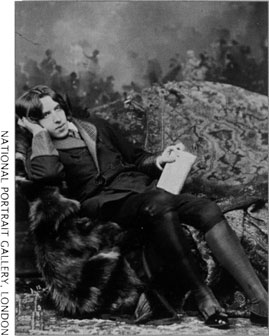|
Loading
|
|
|
 Oscar Wilde 1856-1900
Oscar Wilde 1856-1900
by Jonathan CroallThe Life
Oscar Fingall O'Flahertie Wills Wilde was born in Dublin on 15 October 1856, the son of William Wilde, an eye and ear surgeon, and Jane Wilde, an Irish nationalist poetess writing as 'Speranza'. He was educated at Portora Royal School in Enniskillen, at Trinity College, Dublin, where he won the Berkeley Medal for Greek, and at Magdalen College, Oxford, where he won the Newdigate Prize for English Verse. A self-confessed aesthete, he was known for his generosity, wit and good nature, although his effeminate behaviour provoked a group of undergraduates to wreck his rooms and duck him in the Cherwell.
He settled in London, where his brilliant conversation, unconventional dress, long hair and iconoclastic views made him the all the rage in society; he was also lampooned in Punch, and satirised as Bunthorne in Gilbert and Sullivan's Patience. In 1882, he embarked on a hugely successful tour of the USA and Canada, lecturing on art, poetry and house decoration. Two years later he married Constance Lloyd, the daughter of a wealthy Dublin barrister; they lived in Chelsea and had two sons. He contributed to literary and artistic journals, was editor of Woman's World for two years, and finally achieved prominence as a writer in the 1890s, first with his novel, The Picture of Dorian Gray, and then with his plays.
In 1892 he fell in love with Lord Alfred Douglas, provoking Lord Queensberry, Douglas's father, to accuse Wilde of 'posing as a sodomite'. Wilde sued him for criminal libel, lost the case, and was himself prosecuted. Found guilty of homosexual offences, he was sentenced to two years' imprisonment with hard labour. In prison he wrote The Ballad of Reading Gaol, and a letter to Douglas, later published as De Profundis. After his release he left England for ever, lived in France and, in 1900, penniless, died of meningitis in Paris, having been received into the Catholic Church.
The Works
Plays
| Other Major Works
|
Wilde and the Theatre
Wilde's continuing fame and popularity as a dramatist more than a century after his death is based on four major plays, originally staged in London during the 1890s. The first, Lady Windermere's Fan, established him as a playwright; the last, The Importance of Being Earnest, has been described as the greatest comedy ever written.
These comedies of manners were not original in their structure or subject matter, which were very much of the period. Their distinguishing features were the wit and brilliance which Wilde invested in the dialogue, characterised primarily by sparkling epigrams ('I can resist everything except temptation') and clever inversion of clichés ('In married life three is company, two is none'), many of which have passed into the language.
Beneath the glittering wit, Wilde deals in the first three plays with questions of private and public morality, sometimes in a melodramatic and sentimental manner. In Lady Windermere's Fan, described by Wilde as 'one of those drawing-room plays with pink lampshades', he explores questions of fidelity, reputation and the nature of good and evil. In A Woman of No Importance the focus is on family secrets, in this case an illegitimate son, and the gap between what people say and what they mean. An Ideal Husband, the best of the three, tells the story of a politician whose wealth and reputation are based on a betrayal.
The director Tyrone Guthrie observed of The Importance of Being Earnest: Though it's full of nonsense, it is also full of profound and utterly charming sense.' In this delightful masterpiece, Wilde casts aside all serious discussion of morality as well as the sentiment of the earlier plays. The result is a blissful concoction of wit and elegance, overflowing with memorable characters and observations.
It is interesting, though hardly essential, to know that the play's dialogue reflects in code aspects of Wilde's own subterranean life. 'Earnest' was apparently Victorian slang for 'gay'; 'Cecily' was a well-known name for rent boys; and 'Bunbury', the fictitious relative, stood for some kind of double-life.
On the day Wilde was arrested, both Earnest and An Ideal Husband were playing to packed houses in the West End. His tragic trial and imprisonment shattered his reputation, turning the public and most of his friends against him. On his death a journalist observed: 'Nothing he ever wrote has the strength to endure. 'Yet his works — most notably the plays, but also the novels, children's stories and poems - continue to delight and stimulate us, and will surely still do so 100 years from now.
Jonathan Croall is a theatre historian and biographer